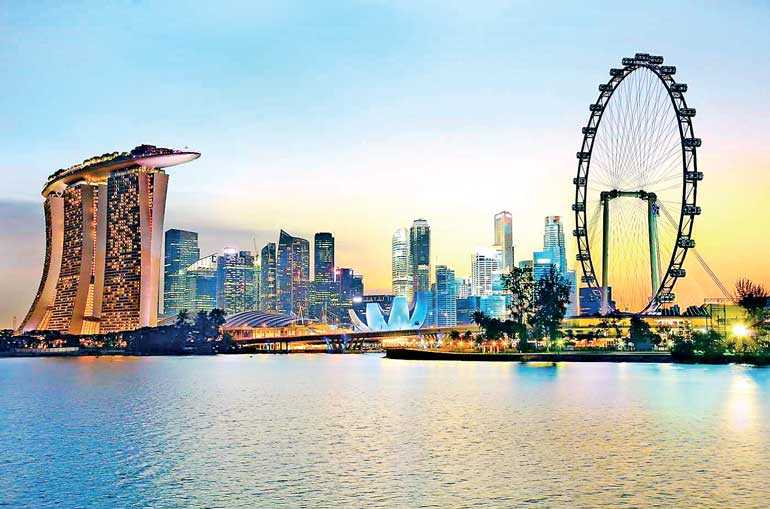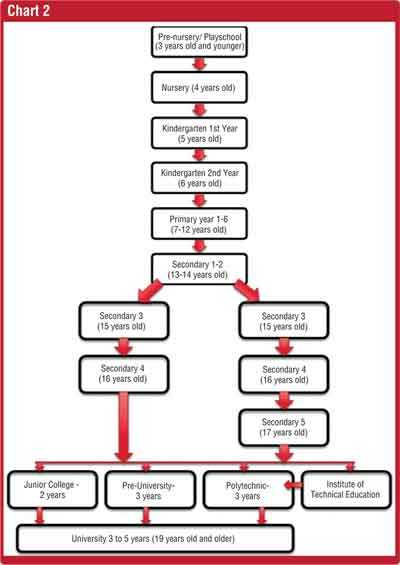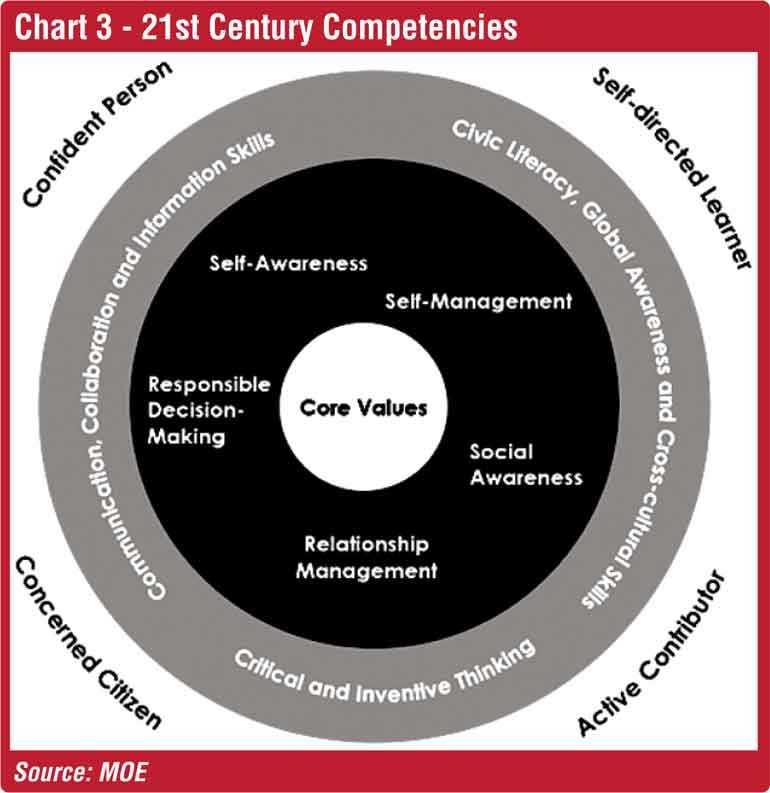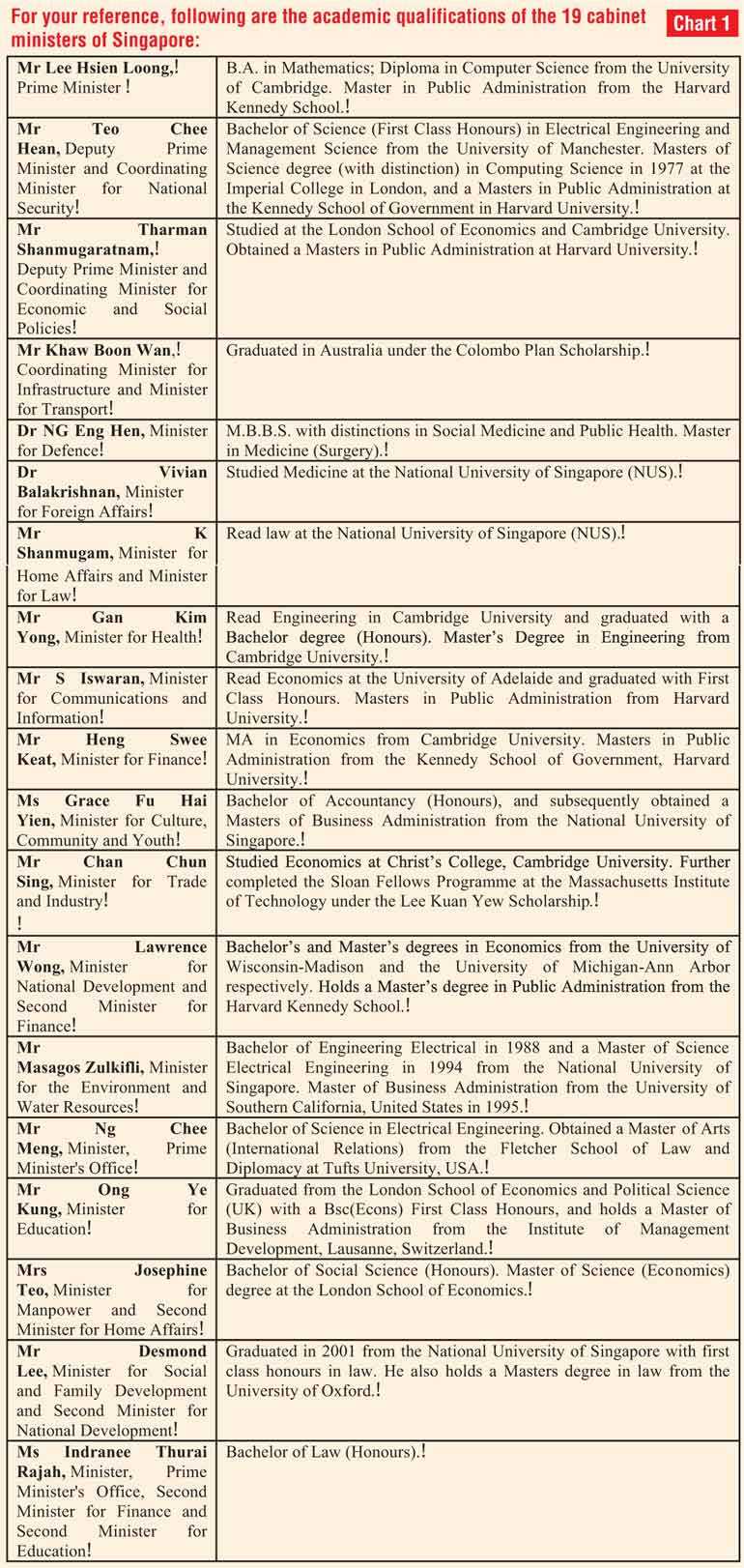Sunday Feb 15, 2026
Sunday Feb 15, 2026
Wednesday, 15 May 2019 00:40 - - {{hitsCtrl.values.hits}}

It would be no exaggeration to describe Singapore to be a ‘quintessential country’ thriving in the Asian region. A high standard of living, a diverse and inclusive society, commendable safety, good governance and a sustainable economy are a few of the many reasons that make the ‘Lion City ‘quintessential.
Born in the beautiful tropical island of Sri Lanka, I take pride in my nation.

However, as a country that was wounded by a brutal three-decade-long civil war, development in the country has been meagre and the various aspects to improve on still remain large. Years of curiosity to learn more about the success of Singapore led me to live and study in this country. I hope to take back a vast amount of knowledge, skills and practical knowhow from Singapore to my home country along with a sense of optimism that Sri Lanka will be just as successful one day.
This article focuses on key factors essential for sustainable development, reflecting on what Sri Lanka could assimilate from Singapore.
Singapore
A country that was once known to be the little red dot in Asia is now a role model for many countries to follow. Located just off the southern tip of the Peninsula Malaysia in Southeast Asia, Singapore is a small island-nation with a population of approx. 5.6 million, a thriving economy worth SGD 487,088 million at current prices (approx. $ 359,926 million) and a real GDP growth of 3.2% (in 2018).
Since its independence from Malaysia in 1965, the country capitalised on its human capital to build a sustainable economy. The limited natural resources in the country made investing on the people the most viable option for Singapore’s late founding Prime Minister Lee Kuan Yew.
Since its inception, Singapore maintained strong ties with Sri Lanka. The ‘Pearl of the Indian Ocean’ was once the aspiration for Singapore to progress. Since the 1900s Sri Lanka was instrumental in inspiring Singapore to be what it is today, by assisting developments in the fields of civil service, law, medicine, education, engineering, housing and sports. However, Sri Lanka was embroiled in the civil war that lasted for nearly 30 years, by which Singapore progressed tremendously surpassing the economy of Sri Lanka.
With a great amount of potential for Sri Lanka to succeed and drive towards greater economic growth, listed below are a few of the significant factors that have made Singapore a sustainable and prosperous city-state. Due to the limitations, the factors explained in this article pertain to 1) governance, 2) national security, 3) education, 4) labour market and 5) social welfare.
Governance
Singapore is a country with one of the lowest corruption rates. The republic scored 85 on the Transparency International 2018 – Corruption Index report. Globally, many countries fail to underpin corruption. However, Singapore has continued to remain committed and resolute in the fight against corruption. Occurrence of public sector corruption remains low with an average of eight public sector employees prosecuted for corruption and related offences over the last three years. 
Singapore’s good standing on fighting against corruption and related offences can be attributed to the comprehensive legal framework enacted in the country. Singapore remains committed to the Rule of Law and considers it to be a critical element for the success of the nation. There is a culture of respect for the law, and an expectation that the law will be impartially enforced, both in Government and in society at large.
The Government of Singapore follows the Westminster System, with three separate branches; namely the Legislature, the Executive and the Judiciary. The cabinet led by the Prime Minister comprises 19 ministers. It noteworthy to observe the ‘appropriate’ competencies and expertise possessed by the Cabinet of Singapore. Having recognised the importance of academic and professional qualifications in broadening intellectual capabilities, knowledge and skills; the cabinet ministers of Singapore are arguably the cream of the crop. The success of Singapore reflects on many economic and social indicators, on the quality of life, social progress and so on.
The academic qualifications of the 19 cabinet ministers of Singapore is shown in chart 1.
The combination of excellent academic qualifications with valuable professional experience has made the cabinet of Singapore a skilful cabinet capable of driving the nation towards greater success. The governments’ praiseworthy efforts in fostering good governance by following six key principles that include 1) meritocracy, 2) racial and religious harmony, 3) a corruption-free government, 4) rule of law, 5) inclusiveness, and 6) care for the environment is a framework for many countries to follow.
Business, industry and commerce
The economy of Singapore is a small yet highly-developed free-market economy. According to the publications by the Singapore Department of Statistics, about 70% of the nominal value added to the economy was generated by the services industries, while about 25% was generated by goods-producing industries.
Services-producing industries included wholesale and retail trade (18.0%), business service (14.9%), finance and insurance (12.9%), transportation and storage (6.9%), information and communications (4.1%) and other services industries (11.5%). Goods-producing industries include manufacturing (21.4%), construction (3.5%) and utilities (1.2%). Ownership of dwellings contributed 3.5% to the nominal GDP. According to the Doing Business 2019 Report published by the World Bank, Singapore ranks second out of 190 economies with a score of 85.23 out of 100.
Today, the diversified and dynamic business ecosystem has produced 263,900 enterprises. The enterprise size can be broken down in to Small and Medium Enterprises (99%) and Non-SMEs (1%). Local enterprises which are enterprises with at least 50% local equity account for 82% while foreign enterprises account for only 18%.
With a total of 3.5 million in employment in Singapore, 2.4 million comprised of local employees and 1.1 million foreign employees. In 2017, the stock of Foreign Direct Investments (FDIs) to Singapore, valued at S$1,568.0 billion in total was contributed by the United States, Cayman Islands, British Virgin Islands, Netherlands and Japan. In the same year, the stock of Singapore’s investments abroad accounted for S$850.3 billion, and investments were made in countries such as China, Cayman Islands, Indonesia, Hong Kong and the United Kingdom.
Education
Singapore is a country that relies on meritocracy. A recent poll by Hays Asia Salary Guide 2019 revealed that over three in five employers in Singapore favour hard skills over soft skills. While there have been ongoing debates that spark criticism for meritocracy, talent and hard work is recognised and rewarded. The moral value of hard work is instilled in children at a very young age.
The structure of the education system of Singapore is similar to that of Sri Lanka with schooling comprising of Preschool, Primary School and Secondary School (see chart 2). In 2010, Britain’s education minister Michael Gove described the education system of Singapore to be one of the “world’s-leading” education systems. Even today, the education system of Singapore is used as a learning-model internationally. In spite of the high cost of education, the quality of education in Singapore is commendable.
Despite Singapore being a multicultural society with a predominant population of Chinese, the medium of instruction in all schools is English. Aside from English, the mother tongue languages such as Mandarin, Malay and Tamil are included in the curriculum. Although Religious Knowledge was introduced to the curriculum as a compulsory subject from 1984 to 1989, it was replaced by Civics and Moral Education in 1992. The rationale for withdrawing Religious Knowledge from the curriculum was because it proved divisive when students had to choose only one religion to study.
As a multi-religious society, Singapore recognised that religion is a strong force in society. It has been known to divide people into sects and classes, provoke hateful comments, and foster exclusiveness and extremism. Because of the sensitivity of religion, the Government ensured that students did not develop a divided mindset. Instead, the Government believed that imparting of knowledge of religious values should be the responsibility of parents.
According to the Ministry of Education of Singapore (MOE), the objective of fostering a broad-based inclusive education system that is both diverse and flexible is to ensure the young will develop the skills, character and values necessary to prosper on an individual and national level.
Further, the MOE has recognised key competencies needed to thrive in a fast changing world (see chart 3). It is envisaged that the ‘21st century competencies’ are fostered in students in order to prepare the new generation to face challenges while also developing the capability to capitalise on opportunities of the new digital age. At the same time, the young are encouraged to be informed of national issues, take pride in being Singaporean and contribute actively to the community. Critical and inventive thinking is encouraged. In order to thrive in a globalised world, importance is given towards improving communication, collaboration and information skills.
Transition from education to employment
The city-state’s persistent attention towards education and meritocracy is reflected in the labour force statistics published annually. In 2018, a more tertiary-educated resident labour force was observed; comprising of 36.7% having a degree, 19.5% having attained a diploma or professional qualification, 11.5% of post-secondary educated (non-tertiary), 16.4% of secondary-educated and 15.9% of workers with below-secondary qualifications. In the same year, a relatively equal labour force participation by both men and women was observed with 54.2% of the resident labour force comprising of men and 45.8% of women. Employment rate (aged 25-64) remained high at 80.3%.
Recognising the importance of continuous education, Singapore introduced the Workforce Skills Qualifications (WSQ). WSQ is national credential system that trains, develops, assesses, and certifies skills and competencies for the workforce. The credential system focuses on improving relevancy, accessibility, progression and authority. WSQ focusses on enhancing skills and competencies, offering both technical and generic training. Technical skills and competencies comprise job-specific skills and competencies that an individual needs to perform various job tasks. Generic skills/competencies refer to employability and transferable skills and competencies that are applicable across job roles. They help the workforce adapt to changing job demands and bring relevant skills across different jobs. SkillsFuture Singapore (SSG) and Workforce Singapore (WSG) are both statutory bodies under Ministry of Manpower (MOM) and play an active role in continuously improving the labour force to ensure a strong and inclusive economy.
Social welfare
As a high-income country that actively promotes ‘productivitism’, social policies are equally important and play a supportive role for economic policies. In the fast-changing world, shaping policies in response to changing needs is crucial. Singapore continues to proactively meet these changing demands in society.
Over the past decade, Singapore has seen a pragmatic shift in tempering the inequalities of life. Some of the key milestones include: Workfare in 2007, which supports older low-wage Singaporeans who continue working and training; the Progressive Wage Model in 2012, which sets wage floors for workers’ skill levels; SkillsFuture in 2015, which encourages lifelong learning; and MediShield Life, also in 2015, a health insurance plan helping to pay for costly hospital bills and treatments.
One of the biggest challenges Singapore is facing is an ageing population with slowing social mobility. One in four Singaporeans will be aged 65 and above in 11 years’ time – by 2030. The figure today is about one in eight. Tharman, Coordinating Minister for Economic and Social Policies, since 2015 says that the dramatic shift in the population has made healthcare a pivotal element to consider for the future of social spending. The Government is constantly finding ways to make healthcare more affordable for the poor. It is observed that the country is taking a practical approach towards social and economic policies, not embedded in ideology.
Government spending demands are the greatest in sectors such as health care, infrastructure and jobs. While proactively researching, analysing, developing and enacting social policies, the Government recognises the importance of a vibrant economy to mitigate the challenges in the long-term that affect the entire population. Singapore continues to focus on improving the inclusiveness in education by addressing factors pertaining to mental health, special needs and incorporating diverse abilities.
Further, the Government continues to introduce efficient social policies to mitigate the challenges faced by the labour force; which include heightening burnout, unattractive salary and benefits, and manpower shortages. Active policy responses are seen in terms of labour market policies and health reforms.
Despite Singapore’s rapid developments, the buzzing city-state is actively finding ways to reduce the harm caused to the environment.
Using the concept of ‘Reduce-Reuse-Recycle’, schools are taking initiative to educate children about reducing environmental damage. Issues pertaining to the reduction of plastic usage and shark fins are some of topics recently raised in Parliament.
The Singapore Green Plan (SGP) is Singapore’s first environmental blueprint that describes the strategies and programmes that Singapore would adopt to maintain a quality living environment while pursuing economic prosperity. The targets mentioned in the updated ‘SGP 2012’ focus on issues pertaining to air and climate change, water, waste management, conserving nature, public health, and international environment relations.
Conclusion
It has taken many years for Singapore to be what it is today. However, it should be noted that the rapid and dynamic development in the country was propelled by visionary leadership. Discipline was taken seriously, both within the Government and in society. The exemplary and charismatic leadership of Singapore’s late founding Prime Minister Lee Kuan Yew transformed Singapore to be a prosperous world-class-city.
Even today, Singapore continues to be a role model for many countries to follow by continuing to highlight the importance of competent leadership, heightened national-security, prioritising education, improving the labour force and introducing effective economic and social policies that address the changing demands of society, both locally and internationally.
(The writer is currently studying Economics at the Singapore Institute of Management, affiliated to LSE, University of London. Having completed her BSc and MSc in International Business Management, the writer is a penchant for economic affairs, financial markets and international trade. She can be reached via email at [email protected].)

